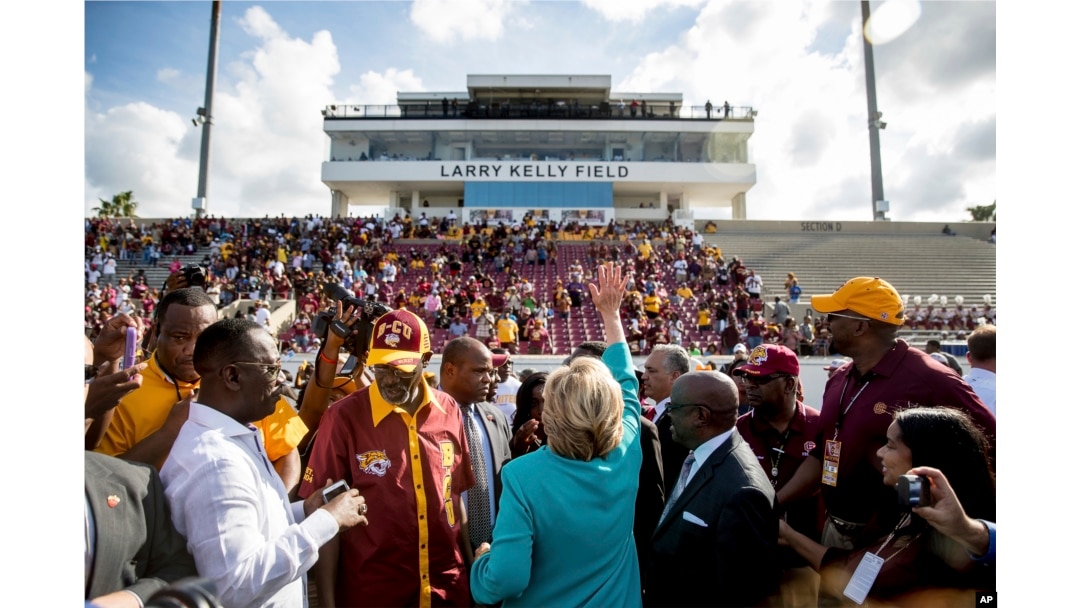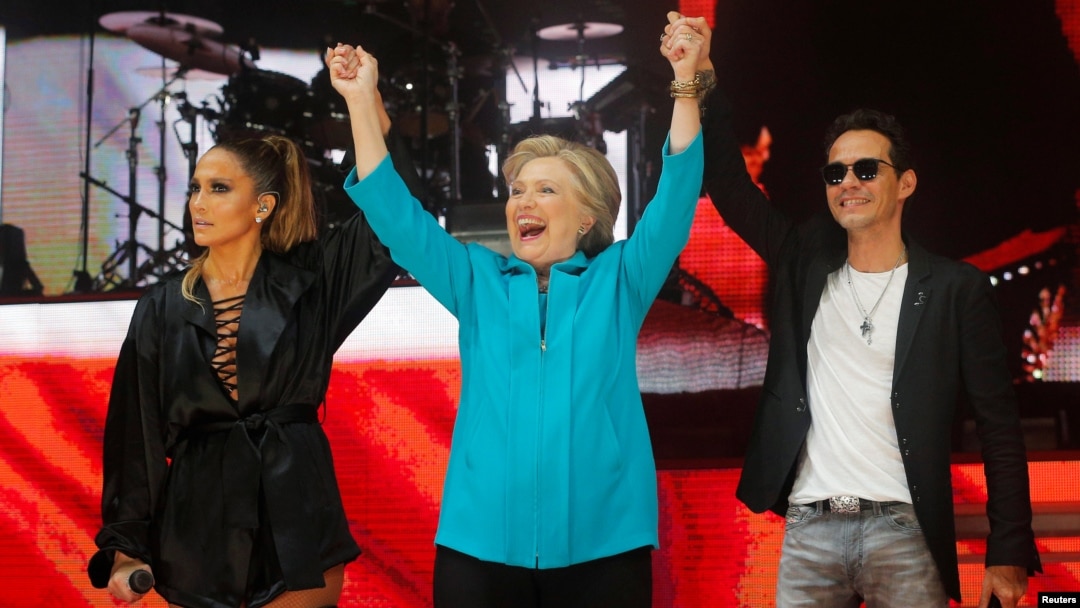Democratic presidential candidate Hillary Clinton on Saturday called the timing of the FBI's announcement that it was assessing new evidence in her email case "unprecedented" and "deeply troubling."
At a campaign appearance in Daytona Beach, Florida, Clinton told her audience, "It's pretty strange to put something like that out with such little information, right before an election."
Clinton later added, "We can't let this election, in the last 10 days, be about the noise and the distractions. It's got to be about what kind of country we want for ourselves, our children and our grandchildren."

Democratic presidential candidate Hillary Clinton waves while visiting a homecoming game for Bethune-Cookman University Wildcats in Daytona Beach, Fla., Oct. 29, 2016, on her way to a rally.
FBI Director James Comey said in a letter to lawmakers Friday that new emails had surfaced that were related to Clinton's case. He made the statement despite an FBI tradition of avoiding controversial actions in the days leading up to an election.
Reports Saturday said U.S. Justice Department officials warned Comey that notifying Congress about the new material was not consistent with department practices. Accordingly, Comey sent a letter to FBI staffers, explaining the reason behind his unorthodox move.
"We don't ordinarily tell Congress about ongoing investigations," he said, "but here I feel an obligation to do so, given that I testified repeatedly in recent months that our investigation was completed. I also think it would be misleading to the American people were we not to supplement the record."
Influencing the race
The FBI announcement sparked criticism that the agency was intervening in the U.S. presidential race. While the emails have been detected, The New York Times reported that law enforcement agents have to get a court order to actually read them, a process that would certainly not be finished before Election Day.
WATCH: Republican Trump Claims Evidence in Democrat Clinton's Email Probe Is 'Overwhelming'
Your browser doesn’t support HTML5
Republican Trump Claims Evidence in Democrat Clinton's Email Probe Is 'Overwhelming'
Republican U.S. presidential candidate Donald Trump on Saturday called this latest wrinkle in the email case "the lowest point in the history of our country."
Trump spoke at a campaign event in the swing state of Colorado, saying, "A vote for Hillary is a vote to surrender our government to public corruption, graft and cronyism that threatens the very foundations of our constitutional system." He vowed that on Election Day, November 8, "we're going to change things."
Political scientist Norman Ornstein of the American Enterprise Institute told VOA that the timing of Comey's announcement was "stunning."
"Clearly, there's no urgency in this matter," he said. "It's not going to be, very likely, sorted out for months. It doesn't seem, on the surface, to involve anything deeply nefarious. ... If you are going to announce it 11 days before the election, you have a deep obligation to be more forthcoming."
Far-reaching implications
Political historian Allan Lichtman said Saturday that Comey might have made the announcement to protect his own credibility, but that the results of his act reached far beyond the personal.
"The tragedy here is, to save himself [from allegations that he hid new evidence], he has significantly biased a presidential election that is vastly more important," Lichtman told VOA. "This is going to set the course for the future of the country, not just over the next four years, but perhaps over the next generation. ... He has no business doing this."
FILE - FBI Director James Comey is sworn in before a House Oversight and Government Reform Committee hearing on Capitol Hill in Washington, D.C., July 7, 2016. Comey's announcement that authorities were again looking into Clinton's email practices sparked criticism that his agency was intervening in the U.S. presidential race.
Lichtman, who is known for his accuracy in predicting U.S. election outcomes, would not speculate on whether the development would sway Clinton voters. He said the Clinton campaign had probably done the only thing it could do in response, which was to call for the release of all information about the case. Clinton made that call Friday, noting that "even Director Comey noted that this new information may not be significant, so let's get it out."
"How do you respond to something that's so vague?" Lichtman said of Comey's announcement. "It may be that there's nothing there of any consequence, but we don't know and you can't draw any conclusions from the FBI letter."
Lichtman also noted that the FBI had been unusually forthcoming on the Clinton case, while staying tight-lipped on allegations that Russia might be trying to influence U.S. elections by hacking into computer systems.
'Political act' by Comey
Jason Johnson, a professor of political science and communications at Morgan State University in Maryland, told VOA he thought Comey was attempting to influence the election.
"It is impossible to separate what this announcement is from a political act," Johnson said. "It is clearly an act on the part of the FBI director to have some impact on the presidential campaign. There is something to be said about caution, about discretion."
FILE - New York mayoral candidate Anthony Weiner, left, listens as his wife, Huma Abedin, speaks during a news conference at the Gay Men's Health Crisis headquarters, July 23, 2013, in New York. FBI investigators found emails related to Hillary Clinton while investigating a "sexting" case against Weiner.
Reports Friday revealed that FBI agents discovered the new emails during an investigation of former U.S. Representative Anthony Weiner of New York, who is separated from top Clinton aide Huma Abedin. The emails were reported to have been found on a computer used jointly by Abedin and Weiner.
Weiner is under a separate FBI investigation for allegedly "sexting" with a 15-year-old girl in North Carolina, a crime that falls under FBI jurisdiction because it took place across state lines. The age of consent in North Carolina is 16; in New York, it is 17.
Republicans rejoice
Republican Party leaders were rejoicing in what they saw as validation of their repeated complaints about Clinton's practice of handling government emails in a nonstandard fashion.
Republican National Committee Chairman Reince Priebus tweeted Friday, "With FBI reopening criminal investigation, Democrats on the ballot must now be asked whether or not they still support @HillaryClinton."
He also tweeted, "This development raises serious ?s about what records may not have been turned over & why, & whether they show intent to violate the law."
Senator Charles Grassley, a Republican campaigning for re-election in Iowa, told reporters Friday that the email server had been "a real problem for the Clintons." Although he was one of the addressees on the FBI letter, Grassley said it was not the result of any request from him to Comey.
WATCH: Democrat Clinton Calls Timing of FBI Email Probe 'Strange'
Your browser doesn’t support HTML5
Democrat Clinton Calls Timing of FBI Email Probe 'Strange'
Democratic Senator Dianne Feinstein of California, a ranking member of the Senate Intelligence Committee, said Friday that she was "shocked" to read Comey's letter.
"Without knowing how many emails are involved, who wrote them, when they were written or their subject matter, it's impossible to make any informed judgment on this development," she said. She also noted the FBI's tradition of avoiding moves that might influence the upcoming election. "Today's break from that tradition is appalling," she said.
Clinton has said she used the private server rather than a more secure government server because it was more convenient for her. Critics say she was trying to shield her communications from the Freedom of Information Act.
Although classified information turned up in email stored on her personal server, which authorities said was vulnerable to hacking, there was no evidence she shared it with unauthorized parties on purpose and tried to cover that up.
Jesusemen Oni and Elizabeth Chernoff contributed to this report.


